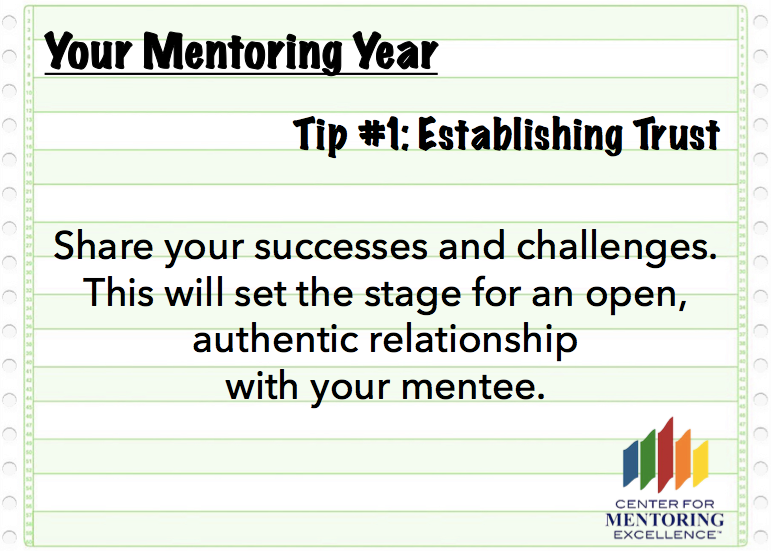
by Center for Mentoring Excellence | Apr 5, 2017 | Facilitating Learning, Growth and Development, Making Mentoring Work For You, Mentoring Communication, Mentoring Questions, Mentoring Relationships, Supporting Mentors and Mentees
Trust is everything when starting out in a new mentoring relationship — and even when you’re nurturing an existing one! While it’s tempting to dive in and drill down quickly to talk about needs and goals at the first meeting, try to avoid this. Instead, focus first on establishing an open and authentic relationship. It takes time and attention, but in the long run, it’s well worth it. You will have established a deeper, more meaningful, trusting relationship. Here are some things to keep in mind:
- Get to know your mentee, and let your mentee get to know you. To jump start the process, come prepared with a list of questions. What is it you want to know about your mentee as a person? What do you want to know about your mentee’s work context?
- Your mentee needs to relate to you, too. Mentees are more forthcoming when a mentor shares their personal success stories, as well as their struggles. If you’re open and authentic, it invites your mentee to be, too.
Check back soon for “Your Mentoring Year” Tip #2!

by Center for Mentoring Excellence | Sep 6, 2016 | Facilitating Learning, Growth and Development, Mentoring Communication, Mentoring Training
At first, mentoring and leadership coaching could seem like interchangeable terms for the same training program. However, when you understand the difference between the two methods, you realize, to be a strong leader, you need both. In their simplest forms, mentoring is about building valuable relationships with other people, while leadership coaching programs concentrate on improving performance.
Mentoring is a robust improvement tool customized for personal growth. Mentorship is an efficient way to help people advance in their careers while building meaningful relationships. Typically, it requires two people (a mentor and a mentee) who work in a related field and share professional experiences. Through respect and trust, the two people work together to realize the mentee’s potential and discuss a plan to achieve their goals.
Although mentoring is an essential tool for all professionals, leadership coaching is equally valuable. Through leadership coaching, you have the opportunity to hone your management skills and enhance your performance as a leader. Unlike mentoring, leadership coaching can be completed in a group or individual sessions.
Leadership coaches are often hired from outside your organization and, sometimes, your field. The separation from the company allows the coach to discuss topics and solve problems that could be unsuitable to address with your supervisor.
To make your career goals a reality, you must understand your professional path and continuously improve your performance. The simplest way to enhance your career experience is through strong relationships with a mentor as well as a leadership coach.
The Center for Mentoring Excellence offers the
tools and
training needed to help you achieve your mentoring and leadership goals. Also, we provide a variety of resources to help you strengthen your leadership abilities and boost your team’s productivity. So what are you waiting for?
Contact us today!

by Center for Mentoring Excellence | Apr 14, 2016 | Growth and Development, Making Mentoring Work For You, Mentoring Communication, Mentoring Questions, Mentoring Relationships
Chemistry. Compatibility. While these traits are crucial to a successful mentoring relationship, there’s so much more involved, most importantly — you. What do you want to learn? Who do you want to learn it from? Recruiting a mentor can seem like a daunting task, but being thorough and prepared when making the ask leads to success.
How to Prepare
Have a conversation with yourself:
- Identify what it is you need to learn.
- Think about what you need from a mentor.
- Consider how much time you can contribute to a mentoring relationship. Look yourself in the mirror and honestly consider if you have the time, willingness and commitment to mentoring.
- Think about your prior mentoring experiences and how you can actively contribute to the success of your relationship.
Ask yourself some important questions:
- Am I sincerely interested in learning?
- Am I willing to commit time to developing and maintaining a mentoring relationship?
- Am I willing to be open and honest with myself and another person?
- Can I participate without aversely affecting my other responsibilities?
Making the Ask
You can do all the preparation in the world, but if you aren’t able to communicate your needs and ask a potential mentor for their time and energy in an inviting and honest way, you may lose out on a great mentoring opportunity.
Make sure to clearly communicate:
- What you want to learn.
- Why you want to learn it.
- Why you think this person is a good match for you.
- What you need from the relationship.
- What you are willing to contribute.
Make sure to present yourself as:
- Competent
- Committed
- Compatible
- Conscientious
- Ready to Learn
- Accountable
With the right preparation, the right communication and the right presentation, you’ll be able to set yourself up for success when asking a potential mentor for their help.
How have you sought out mentors? What worked and didn’t work for you?

by Center for Mentoring Excellence | Aug 4, 2015 | Facilitating Learning, Making Mentoring Work For You, Mentoring Communication, Mentoring Relationships
“A story is the shortest distance between two people.”
— Pat Speith
Sharing personal stories, successes and challenges serves multiple purposes in a mentoring relationship.
- Stories build trust, keep a mentoring relationship real, create a comfort level, and give your mentee “permission” to share their own.
Hearing stories about your career and personal challenges provides a powerful impetus for mentees to take action.
- Your setbacks remind them that successful people do face and overcome roadblocks.
By sharing strategies for solving problems and dealing with adversity your mentee learns from your experience.
- According to psychologist Uri Hasson, “Anything you’ve experienced, you can get others to experience the same.” People accept ideas more readily when their minds are in story mode.
Telling your stories and sharing your learning demonstrates openness and respect, and builds trust.
- It creates points of connection, a shared language, and grist for ongoing conversation.
Your story motivates mentee self-reflection.
- It activates their brain cells, stimulates critical and creative thinking, and increases their self-awareness.

So, what is your story?
How can you tell it in such a way that it invites conversation, reflection and learning?
Encourage your mentees to share their stories by:
1. Sharing yours
2. Thinking, in advance, about what you really want to know about them
3. Asking specific questions to encourage them to reflect on their career path, specific experiences, previous successes, and work projects
4. Listening closely to what they say, how they say it, and the words they use to describe their experiences
5. Asking probing questions to encourage them to reflect on the lessons they have learned from their stories
by Center for Mentoring Excellence | Jun 10, 2014 | Mentoring Communication
In a recent survey conducted through our Center for Mentoring Excellence, listening emerged as the top mentoring best practice. Readers of our monthly e-letter, Mentoring Matters, also identified listening as the #1 attribute of a good mentor.
Here’s what they told us about listening:
- Listening at all levels is the most important thing that I do.
- Listening to others and helping them find their own way.
- Listen with an open mind without being judgmental.
- Truly listen so assumptions are not being made.
- Listen fully and carefully before offering your advice or opinion.
- Spend more time listening than talking.
- Listening and questioning to help my mentee reach their solutions.
- Be authentic, be warm, be honest and be an engaged listener.
- Mentors should know themselves well enough to know when their personal strengths or biases cloud the way they listen to and encourage/advise their mentee.
- Hear what is said in between the message, not just listening to what is said.
- Read, observe, listen and ask lots of questions
There is a clear message here about the importance of listening.
Listening serves many purposes in addition to letting mentees know that you care. Listening builds mentee confidence. It lets mentees know they have something meaningful to contribute. Listening encourages them to work out their thinking. Invariably, they arrive at a solution on their own. Mentors often discover that the listening skills they develop through mentoring transfers to other functions, boosting their effectiveness in their other leadership roles.

What can you do to improve your skill at listening?
- Identify the good listeners you know.
- What do they do that shows they are listening?
Make a list of those behaviors and then gauge how you measure up.
- What do you need to do more of?
- What do you need to do less of?
- What is one thing you can work on right now that will help you develop and hone your listening skills?
by Center for Mentoring Excellence | Dec 8, 2010 | Mentoring Communication
It is a mentor’s artful balance between support and challenge that creates the momentum that enables the mentees to make significant progress toward achieving his or her goals. (more…)








